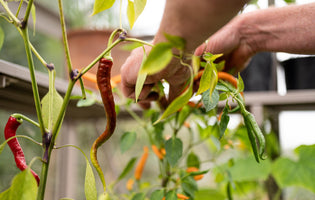Although we like to think we’re all “sowing the seeds of love”, as the famous Tears for Fears song goes – the reality is that amateur or beginner gardeners frequently struggle to know which seeds to sow in each month of the year. Even some genuine green thumbs battle to keep up with their planting calendars or sowing schedules.
Different flowers, plants, fruit, or veggies require planting at different times of the year. Some months, such as the spring months, have a greater number of options for seed sowing available. But, did you know that even in the months that most people write off as icy and “inactive”, such as December, January or February or the less obvious ones, such as October and November, there are still some sensational seeds to sow?

All you need is a little inspiration, some gardening gusto, and a handy monthly seed-sowing guide.
This in-depth piece explains what seeds to sow each month, helping gardeners plan their seed shopping for the year and get the most rewarding and year-round enjoyment from their garden or allotment!
Here’s a quick glance at our monthly seed-sowing guide.
Jump to a specific season:
Seeds to sow in January
January might feel like a dormant month as far as growing is concerned, but there are a few flower seeds, fruit plants and veggie seeds that you can sow and grow now for plentiful pickings come springtime.
The following are the best seeds to plant in strong greenhouses where they’ll be protected from the harsh and icy elements indoors:
Veg:
- Chilies
- Microgreens such as radish, spinach, beetroot, mizuna, rocket, coriander, mustard and fennel
- Potatoes
- Herb seeds
- Onion seeds
- Garlic: outside
- Fruit: woodland strawberries, “Glaskin’s Perpetual” rhubarb
Flowers:
- Sweet peas
- Snapdragons
- Pelargoniums
- Carnations/ pinks
Seeds to sow in February
February might be the chilly tail end of winter, but springtime is certainly beckoning on the horizon! There are plenty of fruits, flowers, and vegetables to sow and grow this month.
Veg:
- Aubergines
- Tomatoes
- peppers
- Broad beans (undercover in a luxury greenhouse would be advisable)
- Cucumbers
- Spinach
Peas
- Chilies
- Jerusalem artichoke tubers outdoors
Flowers:
- Hardy perennials
- Sweet peas
- Chrysanthemums (start them off in a greenhouse for an earlier bloom)
- Hollyhocks
- Stock
- Geraniums
- Dahlia tubers
Seeds to sow in March
Woo-hoo, it’s March, and spring is finally here. In milder parts of the UK, the soil is beginning to warm up for outdoor planting. However, plenty of seeds can be started in a propagator if you're still getting frost.
Veg:
- Tomatoes
- Chilies
- Aubergines undercover
- First early potatoes outdoors
- Swiss chard
- Radish
- Spring onions
- Spinach
- Kale
Half-hardy flower annuals such as:
- Tagetes
- Cosmos
- Nicotiana
- Cleome
- Amaranthus
- Zinnia
- Marigold
- Cornflowers
- Morning Glories
Seeds to sow in April
Gardens begin to burst back into life with the welcome combination of sunshine and showers. On a good day, it can feel like the weather has indeed turned - although there may still be a bit of frost or a few showers.
Veg:
- Runner beans and courgettes under glass on a sunny windowsill or in a greenhouse
- Aubergines
- Chilies
- Tomatoes
- Squashes
- Pumpkins
- Marrows
- Leeks (under cover)
- Beetroot
- Carrot
- Celeriac
- Peas
- Swiss chard
- Second early and maincrop seed potatoes
- Onion and shallots
- Jerusalem Artichokes
Flowers:
- Nicotiana
- Cosmos
- Morning glory
- Something different: Few people have heard of “cutting celery”, much less growing it in their gardens. Other names include parcel, leaf celery, and wild celery. It resembles parsley, but it tastes like celery
Seeds to sow in May
One of the loveliest months of the year. The weather is noticeably warmer and sunnier, the days are becoming longer, and summer is definitely on its way.
Veg:
- Purple sprouting broccoli
- Spring onions outside
- Spinach
- Lettuce
- Beetroot
- Radish
- Cucumber
- Peas
- Carrots
- Sweetcorn
- Courgettes (undercover at the start of the month, outside toward the end of the month)
Flowers:
- Candytuft ‘Dwarf Fairy’ cornflower
- Sunflowers
- Zinnias
- Foxgloves
- Sweet rocket
- Patio shrubs
- Lavender

Seeds to sow in June
It’s time to sit back, open that bottle of Rosé and enjoy! With the longest day bringing oodles of extra warmth and sunshine (fingers crossed), you can start planting in earnest.
Veg:
- Beetroot
- Radishes
- Lettuce
- Peas
- Runner, French and soybeans
- Spring onions
- Courgettes
- Lettuce
- Carrots
Flowers:
- Zinnias
- Foxgloves
- Wallflowers
- Cosmos
- Sweet rocket
Seeds to sow in July
July is the ideal growing month with its long warm days. Vegetable gardens are bursting with produce, and borders are at their peak, so you’ll be busy watering, keeping on top of weeds and monitoring for pests. If you’re planning a holiday, invest in an irrigation system to look after fruit, flowers and veg while you’re away.
Veg:
- Runner beans
- Swiss chard (for crops the following spring)
- Kale
- Winter cabbage
- Spinach
- Spring onions
- Potatoes for Christmas
- Radishes
- Beetroot
- Lettuce
Flowers:
- Foxgloves
- Wallflowers
- Sweet rocket
Seeds to sow in August
Savour your garden this month while it’s looking superb. There are also many yummy ripe fruits and vegetables ready to munch. August is also the time to plan ahead if you want gorgeous autumn and winter blooms or plenty of healthy fresh produce for your plate over the colder months.
Veg:
- Lettuce (keep out of the glare of direct sun)
- Rocket
- Spring onion
- Radish
- Winter salads
Flowers:
- Winter-flowering pansies
- Viola ‘Pot Pourri Mixed’
- Hardy annual seeds like poppies
- Californian poppies
- ‘Dwarf Blue Midget’ cornflower
- Calendula
- Larkspur
Seeds to sow in September
For many gardeners, September heralds the peak of harvest time. But there’s still loads to sow and grow this month. If you end up with a autumn glut here are a few ideas on what you can do with your glut.
Veg:
- Spinach
- Winter salads
- Radish
Flowers:
- Ammi majus and other hardy annuals
- Euphorbia
- Dierama Calendula officinalis ‘Neon’
- Lupins ‘Band of Nobles Mixed’
- Hollyhocks
Seeds to sow in October
October's crisp autumnal days usher in the gentle change of colours, longer nights, and the occasional spot of frost. If you grow veg and fruit, you're probably still harvesting and storing this year's crops.
Veg:
- Winter salads
- Peas
- Garlic
Flowers:
- Sweet peas
- Crepis rubra
- Hollyhocks, such as ‘Creme de Cassis’
- Sweet peas
- Aquilegia vulgaris
- Oriental poppies
- Plant daffodil bulbs, allium bulbs and crocus bulbs for a stunning spring display.
Seeds to sow in November
Come November, things might be slowing down in the garden. Milder areas experience their first frost, and the days are rapidly shortening. There’s still plenty to do in the garden this month, and an abundance of veggies, flowers and fruits can be sown and planted now for a spring harvest or to crop through winter.
Veg:
- Garlic
- Onions
- Shallots
- Broad beans
- Onion, shallot, and garlic sets
- For something different this year, plant the massive elephant garlic. These huge bulbs have a very mild flavour and are perfect for roasting
- Plant asparagus crowns Growing these expensive spears yourself will save you a bundle and produce a crop with superb flavour
Flowers:
- Sweet peas
- Laurentia
- Delphinium hybridum 'Pacific Giants Mixed'
- Verbascum
- Foxglove 'Excelsior Hybrid Mixed'
- Lupins
Seeds to sow in December
Seed sowing is unlikely to be on your mind at this chilly time of year, but did you know – garlic is traditionally planted on the shortest day of the year? You can also sow versatile and marvellous microgreens year-round for a fabulous pop of flavour.
Veg:
- “Winter Gem” Lettuce
- “Sweet Green” Basil
- “Aquadulce Claudia” broad bean
Flowers:
- Sweet peas
- Half-hardy annual seeds like antirrhinums (Snapdragons) and Laurentia ‘Stargazer Mixed’
- Begonia semperflorens 'Options Mixed'
- Geranium ‘Moulin Rouge’
- Plant out indoor-grown forced hyacinth bulbs in borders and garden beds after Christmas flowering is over. They’ll flower again next year
Let’s turn our attention to the seasons…
Seeds to sow in Spring
So spring has sprung, you’re invigorated, and your raised garden beds are ready and waiting!
Spring is the ideal time to start germinating your vegetable seeds for planting in your garden. Your plants need longer days and extra warmth for viable harvests later in the year. Watch out for veg that don’t enjoy the late spring frosts that may make an appearance. For successful spring planting, sow seeds that can go straight into the ground.
Give these veg a whirl:
- Cucumbers
- Beetroots
- Carrots
- Peppers
- Broccoli
- Garlic bulbs
For some bloomin’ marvellous spring colour, try these fab flowers:
- Cosmos, including Cosmos sulphureus for dyeing fabric
- Nasturtiums
- Ammi majus
- Marigolds
- White corncockles
- Nigella (all the colours)
- Sweet peas
- Cornflowers
- Phacelia
Seeds to sow in Summer
There are natural advantages to sowing seeds in summer. The warm sun and longer days provide great growing conditions. You’ll also benefit from mess-free sowing outdoors.
Summer is the ideal time to start perennials and biennials and some hardy annuals to flower in late summer and early autumn when many half-hardy bedding plants are past their best.
Sowing hardy perennials in summer is a great way to stock a new border economically. The many options include lupins, delphiniums and grasses.
Sow speedy annuals such as night-scented stocks and cornflowers straight into tubs, in the front of flowerbeds, in hanging baskets or gaps between other plants. Sown in June, they'll flower within six weeks. According to the RHS, gardeners can sow corn salad, land cress and oriental salad leaves in late summer to provide “cut-and-come-again” leaves through the autumn and even winter if protected.
- Brassica salads
- Spinach
- Herbs
- Lettuce
- Peas for shoots
Something different: Due to its extra spicy kick when used as a seasoning, Tulsi basil is sometimes called “hot basil”. It has been used historically as a medicinal herb and for religious purposes in Hindu worship.

Seeds to sow in Autumn
Many seeds collected in autumn can be sown straight away.
Sowing seeds in autumn imitates stratification, which happens naturally in nature. The seeds fall to the ground, and cold weather triggers them to germinate in spring.
You can sow seeds in autumn, prolonging the cropping season. Weather is a major factor, so it may be necessary to cover any crops sown directly outside. Autumn sown seeds provide fresh veg in winter and an early spring crop. Some need to be kept undercover in a frost-free environment, but some can be sown directly into their cropping positions.
For beautiful blooms, try the following seeds to sow in Autumn:
To munch on:
- Spring Cabbage
- Onions
- Garlic
- Salad leaves
- Strawberries
Seeds to sow in Winter
Winter sowing is a well-established technique for planting seeds outdoors at this time of year, specifically to give them a head start in spring. While the idea of starting seeds early goes back a long time, winter sowing is becoming increasingly popular.
Some good options for your first efforts at winter sowing include
Flowers:
Vegetables:
Generally, cold-weather vegetables, perennial seeds, hardy annual flowers and herbs will work well with winter sowing.
A few quick seed-sowing tips
If you’re new to gardening, here are a few practical planting pointers:
- Keep records of when you sow
- Store seeds properly
- Pick your sowing containers and clean them well
- Use a good quality seed compost
- Label before you sow
- Get the temperature correct
- Cover the seeds
- “Harden off” before placing outside
- Water only when needed
- Feed your plants
- Sow at the correct depth
- Once the first leaves are showing, they need to be moved to a position with good light
If you’re a seasoned gardener who already knows your way around all things sowing and growing, you’ll still find the following helpful:
- Never weed out seedlings you don’t know. They may be plants or wildflowers you (or the bees and butterflies) are thrilled to have in your garden.
- Don’t forget to stagger your sowing so you don’t get a glut come harvest time. Succession growing spreads the harvest. Still, sharing is caring – so if you get more than you bargained for, why not give the neighbours some of your extras?
- Always use fresh seed compost, clean pots or trays and water only with water from the tap. Many varieties are prone to the disease ‘damping off’, and if you cut corners, they won’t be forgiving.
- The “heartline” on your hand provides a perfect groove through which small seeds can be trickled out to ensure even and thin sowing. Merely tip a small number of seeds into the palm of your partially closed hand. Then with your other hand, gently tap the base of your thumb with the fingertips of your other hand to move the seeds down the heart line and off the edge.
FAQs
What month do you sow seeds?
If you’re becoming a dab hand at following your monthly seed-sowing guide, you’ll know, as a rule of thumb, it’s best to sow seeds between late summer and mid-autumn. The soil is warm and damp from the rain, providing the ideal environment for germinating seeds. There’s also less competition from weeds around this time of year.
Which seeds can I just scatter?
Something edible: dill, peas, carrots, beets, radish, turnip, strawberry, lettuce, chamomile.
Something pretty: love-in-a-mist (Nigella), foxgloves, poppies, sweet rocket, pansies, sweet peas
Which seeds should I start indoors in February?
February might be the chilly tail end of winter, but springtime is peaking around the corner.
The seeds to sow in February are as follows:
- Lobelia
- Antirrhinums (snapdragons)
- Laurentia
- Chrysanthemum
- Sweet peas
- Geraniums
- Early potatoes
- Tomatoes
- Asparagus
- Basil
- Aubergine
In summary:
Being savvy about which seeds to sow in which seasons will become second nature with a bit of research and practice. Some can be sown successionally over several months to avoid surpluses and ensure a steady stream of beautiful blooms and healthy and delicious harvests.
Sowing seeds is massively rewarding and tremendous fun! It’s also the most cost-effective way to enjoy an abundance of flowers, fruit and vegetables throughout the year.







